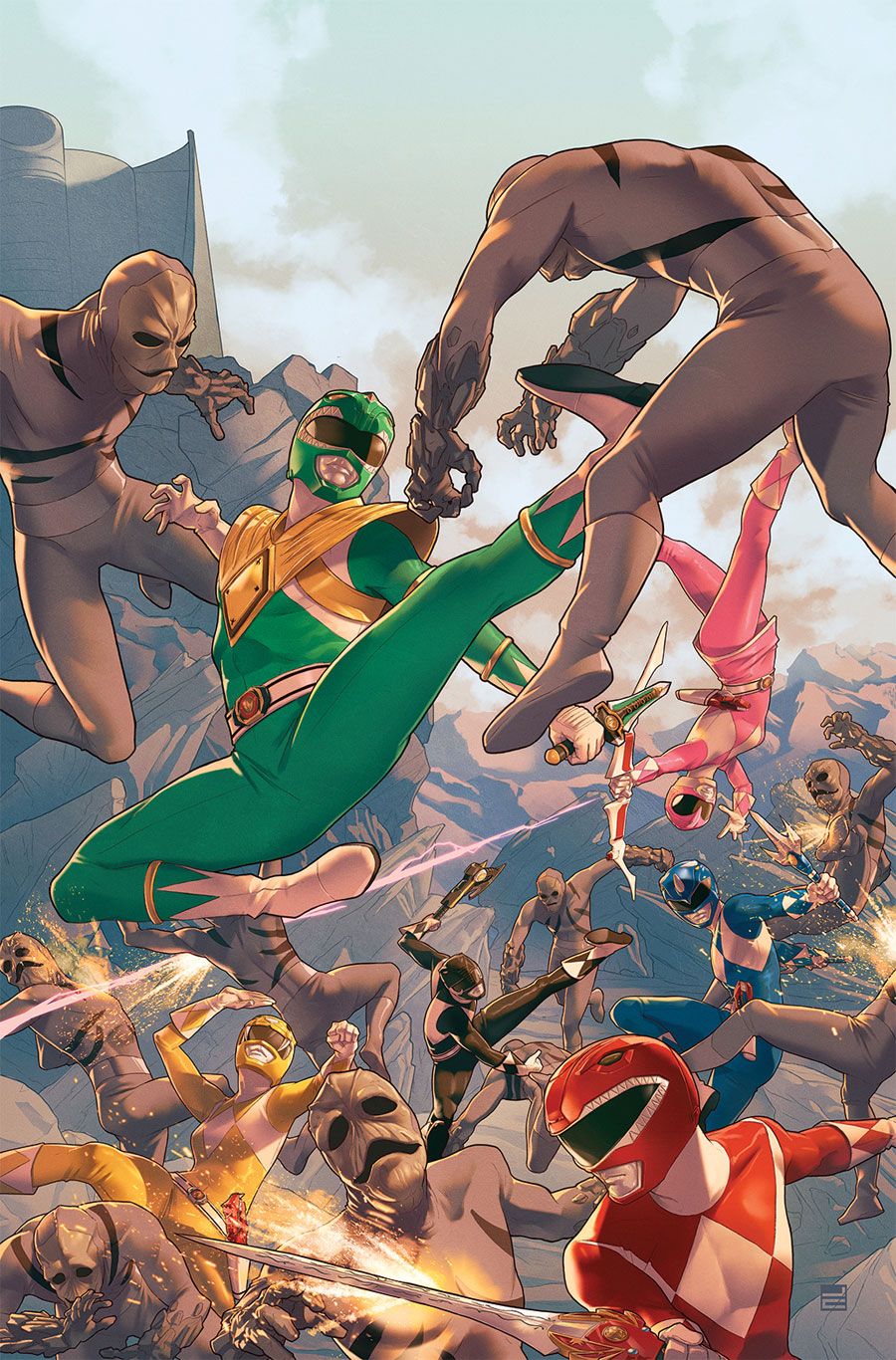"What do the Power Rangers mean to you?"
Early in Kyle Higgins and Hendry Prasetya's "Mighty Morphin' Power Rangers" #1, professional doofuses Bulk and Skull shove a camera in Tommy Oliver's face and ask him this question, creating the central theme of this opening chapter. If you're reading this, you're likely the type of person who has asked yourself this same question. I did, both before and after reading this issue.
RELATED: "Mighty Morphin Power Rangers'" Pink Ranger Lands Solo Series at BOOM! Studios
Higgins uses this era of the team to bring new and old readers together as Tommy shows us what being a Green Ranger means to him. Throughout the issue, he's haunted by the Ghost of Christmas Repulsa, reminding him of his failures and pushing his buttons in an attempt to lure him back to the dark side of the moon. Higgins uses this metaphor for adolescence to corner the character. For Tommy, the Rangers mean redemption. They mean he's not a prisoner of fate, of a life dictated by someone else. They mean a passage into adulthood.
This means sacrifice. He's willing to prove to himself -- and the devil on his shoulder -- that this is what he wants. That means being the best, no matter what, which leaves Kimberly on the outside looking in once again. She wants to show him what the Rangers mean to her: that they're also a family, that they can open up with one another. For now, though, Oliver stays locked inside his gold shoulder pads, unable to let anyone in.
Higgins leaves Tommy in what should be a teenage dream: a confident beautiful woman wearing not much at all appearing in his bedroom. For him, though, it's the past catching up to him, threatening to hold him back because that's who it says he is.
Higgins tackles big issue stuff, showing readers that -- no matter what's happening -- you don't have to do it alone. Tommy tries, but -- when the hard times or the sexy demons show up -- he's the only one there to fend them off. He so badly wants the Power Rangers, he's driven by the fear of losing the one thing that has made him feel like he has something to give back to the world. He tries to prove too much, to cover up when he should open up. He doesn't realize Zordon put him on this team because he believes in him or that his team takes him in because they believe in him. These are pretty great themes for a comic based off a children's show.
There isn't a lot going kablooey in this issue, which forces Prasetya to find some dynamic ways to deliver teen classroom drama. The manga storytelling influence is evident in the everyday scenes, and his character work reminds me of Takeshi Miyazawa (if Miyazawa's characters worked out like the cast of "Predator"). Matt Herms picks up a lot of slack by separating characters and colors in these scenes as well as creating textures.
His style gives these school scenes some flair, but he looks more at home in the action. Those pages let him cut loose, starting with a double-page spread of Rangers Pink and Green fending off a city attack. Tommy is in control here, comfortable hiding behind the mask. Prasetya draws a character who feels safe and confident when he is free to think of something other than his troubles. Even the non-powered characters in the scene seem charged up in Prasetya's design and attention to composition.
Boom! Studios wraps this new #1 in about 8000 covers. The standard cover from Jamal Campbell is frame-worthy; the piece pulls your eye in with the Green Ranger in the foreground, then slowly spirals counterclockwise through the entire cast as they perform feats of badassery. Look at that Pink Ranger bow shot -- hell yes! Kevin Wada's "Breakfast Club" piece, the Sina Grace romance novel shot of Tommy and Kimberly and Helen Chen's future cool team shot are also noteworthy.
Boom! also hits their children's roots with a Bulk and Skull backup by Steve Orlando and Corin Howell, which has some fun with the characters. The lead story is good but takes itself pretty seriously; this section lets Orlando and Howell work on the slapstick elements of the duo, which always popped up on the show.
I always thought the show was kind of corny, but I still loved it. The action was fun. The designs of the heroes and villains and their ephemera were cooler than any other show aimed at the children's market. However, I felt like a lot of it was written down to kids instead of to them. The comic removes these elements and gives readers a great distillation of what made the series cool: the action, the costumes and the robots, but also the friendships, the struggles with being a teenager and the themes of responsibility. Higgins doesn't speak down to his audience; it's accessible to everyone. It has the advantage of taking the superhero concept and reverse-engineering it to a medium that works for those kinds of tales.
I love this franchise because it reminds me of days spent with my brother, Zords and monsters scattered across the living room floor, calling out action and smashing characters into headquarters and doing Zordon impressions to make each other laugh. Being wowed by the martial arts action sequences, knowing that it was kind of corny but fun -- fun enough to make up our own Power Rangers stories to tell to each other.
To me, Power Rangers means family.
What do the Power Rangers mean to you?

